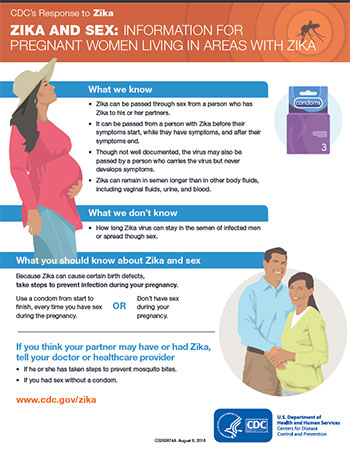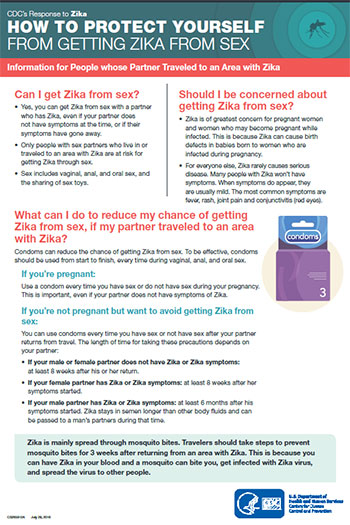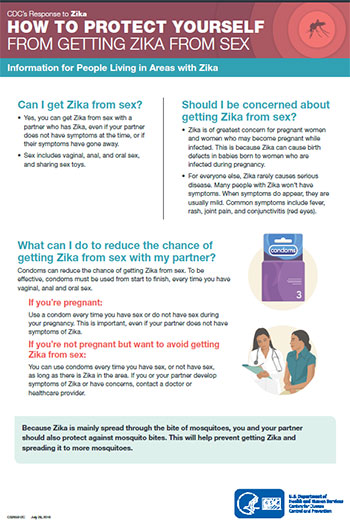Zika and Sexual Transmission
Additional Guidance
Basics of Zika Virus and Sex
Transmission
- Zika can be passed through sex from a person who has Zika to his or her sex partners.
- Sex includes vaginal, anal, oral sex, and the sharing of sex toys.
- Sexual exposure includes sex without a condom with a person who traveled to or lives in an area with Zika.
- Zika can be passed through sex, even if the person does not have symptoms at the time.
- It can be passed from a person with Zika before their symptoms start, while they have symptoms, and after their symptoms end.
- It may also be passed by a person who has been infected with the virus but never develops symptoms.
- Studies are underway to find out how long Zika stays in the semen and vaginal fluids of people who have Zika, and how long it can be passed to sex partners. Current research shows that Zika can remain in semen longer than in other body fluids, including vaginal fluids, urine, and blood.
Prevention Basics
- Not having sex eliminates the risk of getting Zika from sex.
- Condoms can reduce the chance of getting Zika from sex.
- Condoms include male and female condoms.
- Dental dams (latex or polyurethane sheets) may also be used for certain types of oral sex (mouth to vagina or mouth to anus).
- To be effective, condoms should be used from start to finish, every time during vaginal, anal, and oral sex and the sharing of sex toys.
- Not sharing sex toys may reduce the risk of spreading Zika to sex partners.
What CDC is Doing
CDC and other public health partners continue to study Zika virus and how it is spread and will share new information as it becomes available. This continuing research may help us find out:
- How long Zika can stay in genital fluids.
- How common it is for Zika to be passed during sex by a man or woman.
- If Zika passed to a pregnant woman during sex has a different risk for birth defects than Zika transmitted by a mosquito bite.
How to Prevent Sexual Transmission of Zika
Pregnant Couples
Pregnant Couples
The risk of Zika from sex is of greatest concern for pregnant women, who can pass Zika to their developing fetus if infected during pregnancy. Because Zika can cause birth defects, pregnant women with partners who live in or traveled to an area with Zika should protect themselves for the entire pregnancy.
Pregnant couples in which one or both partners live in or traveled to an area with Zika should:
- Use condoms from start to finish every time they have sex or not have sex during the pregnancy. This is important, even if the pregnant woman's partner does not have symptoms of Zika or feel sick.
- Not share sex toys during the pregnancy.
- Take steps to prevent mosquito bites while in an area with Zika. Zika is mainly spread by the bite of infected mosquitoes.
- Travelers should take steps to prevent mosquito bites for 3 weeks after returning from an area with Zika, even if they do not feel sick. This is because you can have Zika in your blood and a mosquito can bite you, get infected with Zika virus, and spread the virus to other people.
Pregnant couples who are concerned that one of them may have Zika should tell their healthcare provider immediately about:
- Symptoms of Zika
- Each partner’s travel history
- How long either partner stayed in an area with Zika
- If either partner took steps to prevent mosquito bites while in an area with Zika
- If they had sex without a condom
Couples Considering Pregnancy
Couples Considering Pregnancy
Couples who are considering pregnancy should talk to their healthcare provider if one or both partners live in or traveled to an area with Zika. See suggested timeframes for waiting to get pregnant after possible exposure to Zika.
Others Concerned About the Sexual Transmission of Zika
Others Concerned About the Sexual Transmission of Zika
Anyone not concerned about pregnancy who wants to avoid getting or passing Zika during sex can use condoms every time they have sex, or not have sex. The recommended length of time for taking these precautions will depend on the person's or couple’s situation.
People with a Partner Who Traveled to an Area with Zika
People with a partner who traveled to an area with Zika can use condoms or not have sex. The period of time for taking these precautions depends on whether the traveler is female or male:
- If the traveler is female: Use condoms or do not have sex for at least 8 weeks after her return from an area with Zika (if she doesn’t have symptoms), or for at least 8 weeks from the start of her symptoms (or Zika diagnosis) if she develops Zika..
- If the traveler is male: Use condoms or do not have sex for at least 6 months after his return from to an area with Zika (if he doesn’t have symptoms), or for at least 6 months from the start of his symptoms (or Zika diagnosis) if he develops Zika. This extended period is because Zika stays in semen longer than in other body fluids.
People Living in an Area with Zika
People living in an area with Zika can use condoms or not have sex as long as there is Zika in the area. If they (or their partner) develop symptoms of Zika or have concerns, they should talk to a healthcare provider.
People who are considering condoms or abstinence should weigh the personal risks and benefits, including
- The mild nature of the illness for many people
- A partner’s possible exposure to mosquitoes while in an area with Zika
- Plans for pregnancy (if appropriate) and access to birth control
- Access to condoms
- Desire for intimacy, including willingness to use condoms or not have sex
- Ability to use condoms or not have sex
Sexual Transmission and Testing
- Pregnant women with possible sexual exposure to Zika should be tested for Zika infection.
- CDC recommends Zika virus testing for people who may have been exposed to Zika through sex and who have Zika symptoms.
- Testing blood, semen, vaginal fluids, or urine is not recommended to determine how likely a person is to pass Zika virus through sex. Because Zika virus can remain in semen longer than blood, someone might have a negative blood test but a positive semen test. The results of the semen and vaginal fluid tests are difficult to interpret.
- As we learn more and as tests improve, these tests may become more helpful for determining a person’s risk of passing Zika through sex.
Additional Resources

Zika and Sex: Information for men who have pregnant partners and live in or recently traveled to areas with Zika

Zika and Sex: Information for pregnant women living in areas with Zika

Pregnant and living in an area with Zika?

Pregnant? Read this before you travel

Zika and Sexual Transmission: For People Whose Partner Traveled to an Area with Zika

Zika and Sexual Transmission: For People Living in an Area with Zika
- Page last reviewed: December 1, 2016
- Page last updated: December 1, 2016
- Content source:




 ShareCompartir
ShareCompartir

